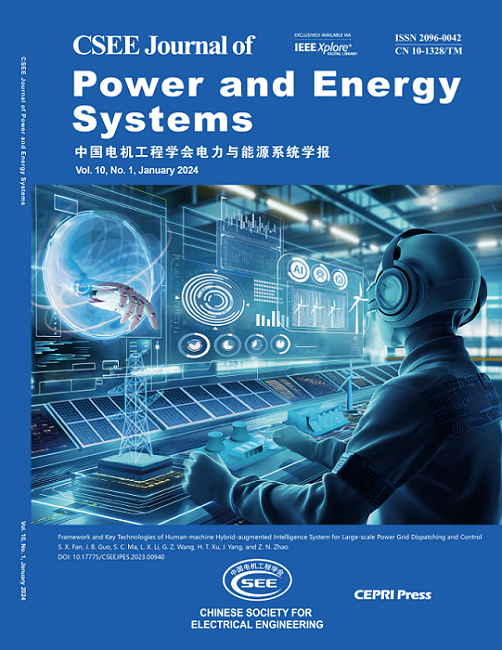Intelligent Predetermination of Generator Tripping Scheme: Knowledge Fusion-based Deep Reinforcement Learning Framework
IF 5.9
2区 工程技术
Q2 ENERGY & FUELS
引用次数: 0
Abstract
Generator tripping scheme (GTS) is the most commonly used scheme to prevent power systems from losing safety and stability. Usually, GTS is composed of offline predetermination and real-time scenario match. However, it is extremely time-consuming and labor-intensive for manual predetermination for a large-scale modern power system. To improve efficiency of predetermination, this paper proposes a framework of knowledge fusion-based deep reinforcement learning (KF-DRL) for intelligent predetermination of GTS. First, the Markov Decision Process (MDP) for GTS problem is formulated based on transient instability events. Then, linear action space is developed to reduce dimensionality of action space for multiple controllable generators. Especially, KF-DRL leverages domain knowledge about GTS to mask invalid actions during the decision-making process. This can enhance the efficiency and learning process. Moreover, the graph convolutional network (GCN) is introduced to the policy network for enhanced learning ability. Numerical simulation results obtained on New England power system demonstrate superiority of the proposed KF-DRL framework for GTS over the purely data-driven DRL method.发电机跳闸方案的智能预测:基于知识融合的深度强化学习框架
发电机跳闸方案(GTS)是防止电力系统失去安全性和稳定性的最常用方案。通常,GTS 由离线预判和实时情景匹配两部分组成。然而,对于大型现代电力系统来说,人工预判非常耗时耗力。为提高预判效率,本文提出了一种基于知识融合的深度强化学习(KF-DRL)框架,用于 GTS 的智能预判。首先,基于暂态不稳定事件,建立了 GTS 问题的马尔可夫决策过程(Markov Decision Process,MDP)。然后,开发了线性行动空间,以降低多个可控发电机的行动空间维度。特别是,KF-DRL 利用有关 GTS 的领域知识来掩盖决策过程中的无效行动。这可以提高效率,改善学习过程。此外,还在策略网络中引入了图卷积网络(GCN),以增强学习能力。在新英格兰电力系统上获得的数值模拟结果表明,针对 GTS 提出的 KF-DRL 框架优于纯数据驱动的 DRL 方法。
本文章由计算机程序翻译,如有差异,请以英文原文为准。
求助全文
约1分钟内获得全文
求助全文
来源期刊

CSEE Journal of Power and Energy Systems
Energy-Energy (all)
CiteScore
11.80
自引率
12.70%
发文量
389
审稿时长
26 weeks
期刊介绍:
The CSEE Journal of Power and Energy Systems (JPES) is an international bimonthly journal published by the Chinese Society for Electrical Engineering (CSEE) in collaboration with CEPRI (China Electric Power Research Institute) and IEEE (The Institute of Electrical and Electronics Engineers) Inc. Indexed by SCI, Scopus, INSPEC, CSAD (Chinese Science Abstracts Database), DOAJ, and ProQuest, it serves as a platform for reporting cutting-edge theories, methods, technologies, and applications shaping the development of power systems in energy transition. The journal offers authors an international platform to enhance the reach and impact of their contributions.
 求助内容:
求助内容: 应助结果提醒方式:
应助结果提醒方式:


